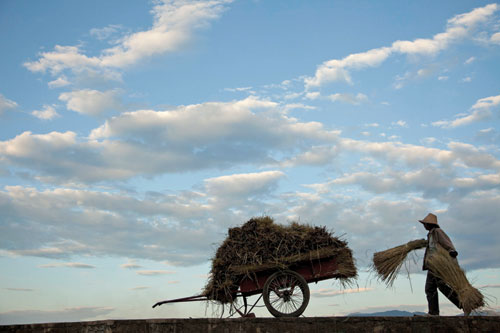 |
|
|
|
|||||||||||
|
 A farmer loads dried rice stalks onto a cart in Xizhou county, Yunnan province. International investors have got a boost as China's potential and its development of the agricultural sector provides good market opportunities. Ariana Lindquist / Bloomberg |
The central government has thrown the focus firmly on food security this year
BEIJING - For those who can sense the way the wind is blowing in China, it is time to sow seeds. During the past nine years, the government has been making a concerted effort to advance the agricultural sector. That's hardly a surprise, given that half of the population lives in rural areas, yet this year's effort is much more down to earth.
|
|
Early every year, China's central government reveals its priority industry by releasing the first major policy proposal, dubbed the "No 1 document". Since 2004, each document has tackled aspects of the agricultural sector. Published on February 1, this year's document focused on the development of agricultural technology.
The publication partly reflected the country's unstinting efforts to maintain food security. Chinese farmers have increased the national grain harvest for eight consecutive years since 2003. In 2011, grain output rose to a record 571 million tons, an increase of 4.5 percent year-on-year. Meanwhile, the production volume has already reached the government's 2020 output target for grain, according to the National Bureau of Statistics.
But shrinking natural resources will pose a grave challenge to the production of bumper harvests in the years to come, said agricultural officials and analysts.
In 2012, the sector will be under "great pressure" to achieve yet another increase in grain yields, said Chen Xiaohua, vice-minister of agriculture, in a recent interview.
To boost the development of agricultural production, the government plans to rely on advanced technology. According to this year's No 1 document, the central government will pump more money into the research and development of agricultural technologies. The total amount invested in areas such as seed breeding, livestock and agricultural logistics will stand at more than 4 trillion yuan ($636 billion) in the decade after 2012, according to reports in the domestic media.
China needs to catch up with more advanced economies by developing cutting-edge agricultural technology, said Chen Mengshan, the chief economist at the Ministry of Agriculture. At present, more than 90 percent of the country's high-end varieties of flowers and vegetables are imported, according to the ministry's data. "A considerable number of research projects are following advanced technologies (across the world)," he said.